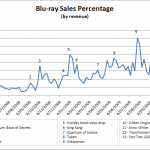Weekly News Roundup (27 December 2009), 2009 Year In Review (Sort of)
Welcome to the last WNR of 2009. As expected, news was extremely light during the height of the festive season, so this WNR will be a year in review of sorts, although it’s mostly based on memory, and a bad one at that. But first, we’ll go through the news that did manage to turn up this week.
The big one was isoHunt losing its lawsuit, but it wasn’t really much of a surprise. In fact, the judge didn’t even see the need for a full trial, giving Hollywood studios an Christmas present in terms of a summary judgement against isoHunt, based on past cases involving Napster and Grokster. isoHunt itself is happily running in Canada, but it is also now under pressure from the CRIA, the Canadian version of the MPAA. isoHunt’s argument that it was only a search engine did not really work, and evidence uncovered showed that the operators actively promoted pirated content, which is really just common sense when you consider torrent sites and what their main purpose is. Take Mininova for example, since it went legit just under a month ago, traffic to the site has dropped 60 to 70%, according to Alexa. The argument that torrent files are just text files won’t really work in court either, not when courts have been happily citing even just simple web links as being infringing content.
Speaking of pirated content, Torrent Freak has compiled data for the most pirated movies of 2009. Leading the chart is Star Trek, closely followed by Transformers: Revenge of the Fallen. Coincidentally, these two are the top selling Blu-ray titles of 2009. I don’t know if there’s any relations between the two set of numbers, other than the fact that these two movies are really popular, and that popular stuff get purchased, or pirated, a lot! The question of how much money has been lost to piracy is extremely hard to answer. There will always be people who, no matter what, will simply not pay for movies. There are those that downloaded the pirated version, liked it, and got the movie on DVD or Blu-ray. There are also those that went to watch it at the cinema and then downloaded the pirated version. How many people would have forked over cash if the pirated version didn’t exist is unknown. Perhaps the studios can try and focus their anti-piracy efforts on one particular movie, and basically go on a huge offensive, getting torrents removed as they are uploaded. I’m skeptical whether any action, even the most extreme, can prevent piracy, but it’s worth a try, even if it means spending 50 million dollars or something. Then see how the revenue of this movie compares to similar releases. Maybe they can then try to prevent a movie from being show on free to air TV or being rented, and see if it helps with DVD sales, and the music labels can get in on the act and prevent a single from being heard on radio, to see if it helps CD sales.
While the studios haven’t prevented a movie from being rented to increase DVD/Blu-ray sales, they have prevented movies from being rented in specific ways. Redbox, the new common enemy amongst several studios, has felt the brunt of the studio’s actions, which claim the DVD rental vending machine operator is hurting rental and sell through income for their movies and have barred Redbox from doing several things, including using box art in their digital displays. Fortunately for Redbox, the law still allows them to rent movies as long as they buy it from retail channels, and that’s what they’ve been doing with releases from Warner, Universal and Fox, and making up their own cover art at the same time. What I don’t understand is why these studios don’t simply do what the others (Disney, Sony, Paramount …) have done and work out a deal with Redbox that benefits all.
It’s this and new methods of viewing that the studios fear though, because they’re losing control. One in three Australians now use DVRs to watch TV, and that’s seen as hurting TV stations what with ad skipping, although our local version of TiVo has removed the ad skipping feature. If the studios (and TV networks) get their way, TiVo and other DVRs won’t exist, which is not good for the consumer (or the electronic firms that sell DVRs). But ads are important, as they are the main source of revenue for TV stations, so a compromise has to be found. The TV networks as we know it will have to change anyway, what with the emergence of TV on demand. Expect this to be yet another battle front in the digital wars.

A cheaper sibling to the Oppo BDP-83 will be available soon, but Oppo's are still hard to find outside of the US
And moving on to HD news, Oppo will release a cheaper version of their highly rated, but as yet unavailable world wide, Blu-ray player. It’s unknown what features will be cut in order to reduce the cost, but most likely it will be the DVD-Audio and SACD features, since most people don’t really need support for these formats. Will it also come with HDMI 1.4, which is also set to be released around January? HDMI 1.4 itself seems to be still in flux, as the HDMI consortium wants to add 3D broadcast support to the standard, along with the new two way audio support and built in Ethernet capabilities that are the headline features of the new version. I for one hope that there will be no more HDMI revisions in the future, because it’s ridiculous that all HD devices sold so far will become obsolete next month as a result of this HDMI change. Of course, most of the newly added HDMI features are not “must haves” that will force people to buy new TVs, and backwards compatibility is being maintained, but still.
And that’s the news for the week, so I guess the rest of the WNR will be for my brief and fairly incomplete year in review.

Starting with copyright. It’s been a year of lawsuits. And most of them have brought success to the copyright holders. We’ve seen The Pirate Bay lose time and time again, and then sold, although it doesn’t seem to affect the website’s operation.
Mininova was probably the biggest casualty, having removed all of its illegal content last month, and as mentioned before, seeing a 60% traffic drop as a result. isoHunt is the latest casualty, having lost the lawsuit just last week, but the website is at least still operational. Expect more closures next year.
Then there’s the Australian lawsuit against ISP iiNet, dubbed the iiTrial. The case went over many of the issues in the piracy debate, specifically about responsibility of ISPs, and whether they should act as copyright cops. We’ll find out the answers to these questions early next year when the verdict is due. This trend of attacking ISPs isn’t just an down under thing, this has been the new strategy of the copyright holders in 2009. From the French introduction of the, albeit watered down, three-strikes legislation, to the MPAA asking for something similar to every government that’s willing to listen, we could see some big changes in 2010 when it comes to the relationship between the government, your ISP and you.
But that’s not to say that the copyright holders haven’t been attacking individuals. Two high profile trials concluded with unbelievable damages being awarded to record profit making Hollywood, $1.92 million and $675,000 against a single mother and a student respectively. This was supposed to put the fear into downloaders, but the fact is that pirated downloads have actually increased during the year.
The positives of 2009 for copyright include the death of DRM for music, when iTunes went DRM free in April, which saw other online music stores doing the same before and after this date. DRM is still well and alive for everything else though and happily ruining user experiences and even movie previews. Several free music services popped up in 2009 as well, as an alternative to illegal downloads, but only time will tell if their business model works in the long term, and on a global scale. 2009 also saw the increasing popularity of Digital Copies, bundled with both DVD and Blu-ray packages. These DRM protected, time limited video files have at least provided a free alternative to DVD ripping, although Managed Copy for Blu-ray is set to do much more, if it ever gets implemented. But we can still say that 2009 saw the first Managed Copy Blu-ray being released.

Which moves us neatly onto HD news for 2009. It was a very good year for Blu-ray, most noticeable in the last quarter thanks to some very high profile releases. The record breaking release of The Dark Knight during December 2008 was only recently shattered by Star Trek and the holiday sales period, but there is no denying the fact that Blu-ray sales have double or more in the year.
Most of this has been due to price cuts, which sees Blu-ray hardware and movies quickly approaching DVD levels, and at times, below that of new release DVDs. Consumers spent less as a result, although this may largely be due to the poor economic conditions, and the growth in Blu-ray revenue was not enough to cover up the losses on DVD, although the situation is not nearly as bad a year ago. Digital downloads and streaming, as well as rental, saw amazing growth during the year as well. Netflix, who offers both digital and traditional rentals, grew strongly thanks to integration with first the Xbox 360, and then the PS3. This is not to mention the increasing number of Blu-ray players that now come with some sort of online streaming support, and Blu-ray players are fast becoming replacements for set top boxes, which everyone always thought would have been necessary for a large scale rollout of digital services.
2009 also saw the HD format war loser, Toshiba, come out with their first, albeit modest, Blu-ray player offering, and thus officially end their ill fated HD DVD adventure. And although HD DVD has died, the innovations that the format provided still lives on in Blu-ray, with the mandatory Internet connectivity on HD DVD players now all but mandatory in name on Blu-ray in BD Live, which has allowed the aforementioned online streaming services to be used through Blu-ray players. And the emergence of Managed Copy, which was first made mandatory for HD DVD, is now coming to Blu-ray, albeit with some resistance. And even the good old double sided Combo is coming back through HD DVD backer Universal.
Most studios still prefer the separate disc combo method, and combo now usually means both the DVD and Digital Copy version of the movie. Digital Copy has made headway as well, now available not only on DRM’d WMV files, but also through iTunes on PCs and Macs, and thus, playability on iPods and iPhones. Digital Copy has been so popular, that it’s hard now to find a new hit release without it. And the general idea of Combos have been popular as well, with Warner recently announcing that all their major Blu-ray releases next year will be combos with both the DVD and Digital Copy included on separate discs. Blu-ray’s value for money has increased as a results, as the ever smaller premium you pay for movies over the DVD version is made up by the inclusion of the DVD version on a separate disc. Disney even made combos the first and only package available to buy for a few of their hit titles, and stats have shown that even after the exclusive period, people preferred to buy the better value combos.
Blu-ray on PCs are still somewhat of a disappointment, but GPU assisted decoding is now available in most systems, even some of the netbook offerings though Nvidia Ion. Will we see a mainstream PC game released exclusively on Blu-ray disc in 2010?
3D promises to be the studios’ next target in 2010, hoping to bring HD 3D to the home via the now finalized 3D Blu-ray specs. Only the tough set of requirements, such as a new TV, rule out the guaranteed success of 3D Blu-ray.
![]()
And finally in gaming, 2009 unfortunately didn’t reach the highs of 2008 in terms of sales. The year started somewhat flat, and then soon saw Wii sales tumble along with most other consoles. Then Sony did what everyone wanted them to do and reduced the price of the PS3, and surprised many with the introduction of a brand new Slim version of the console. Both of these factors revived the fortunes of the PS3, taking it from last place amongst the home based consoles to nearly topping the monthly sales of the Wii. The holiday period, and the biggest release in the history of music, movies or gaming, Call of Duty: Modern Warfare 2, helped the Xbox 360 regain some of the lost momentum after the PS3 Slim/PS3 price cut. Even the Wii had a recovery of sorts during the holiday sales, but is still easily 30+% down compared to last year, although 2008 was crazy in terms of Wii sales.
The PSP Go largely flopped, while the DS, with the updated DSi, now completely dominates the handheld market.
In terms of games, Call of Duty: MW 2 was easily the best selling game of 2009, and of all time possibly, at least for the release figures. The PS3 had a couple of hit exclusive titles (Kill Zone 2, inFAMOUS, Uncharted 2) that did well enough, but there still aren’t enough consoles in the US to really make these sell. Game sales are down as well compared to 2008, even though the biggest hits of 2009 were bigger than the hits of 2008. But 2009 was still the best year outside of 2008 in the history of gaming, and things only look to improve as Sony and Microsoft both bring out their motion control systems next year, although in Microsoft’s case, it will be towards the end of 2010. You can vote for your game of the year here.
A more detailed 2009 roundup will be written up as soon as the December figures are released in the middle January.
And that’s pretty much 2009 in review, very brief I know and missing all of the crucial events that I’ve failed to remember. News is likely to be hard to find next week as well, and so if there’s nothing to write about and if I remember more stuff, then perhaps you’ll see part two of the 2009 year in review then.
But until then, I hope you’ve had a great 2009 and everyone here at Digital Digest wishes you a happy and prosperous 2010. HNYIA (Happy New Year In Advance)




